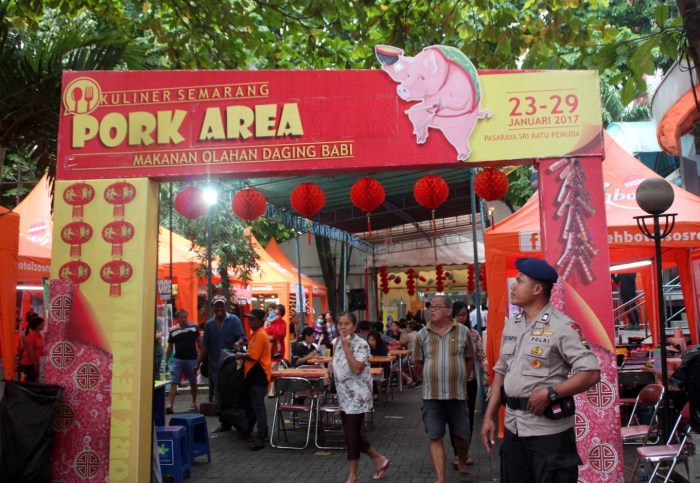Pork Festival: Dive into a world of sizzling delights, rich traditions, and vibrant communities. From the smoky aroma of slow-cooked ribs to the lively sounds of festive music, pork festivals around the globe offer a unique blend of culinary excellence and cultural immersion. This exploration delves into the history, diverse dishes, economic impact, entertainment, and social significance of these captivating events, revealing the fascinating story behind the pig and its prominent role in global celebrations.
We’ll uncover the historical roots of pork festivals, tracing their evolution across continents and exploring the cultural significance of pork in various societies. We’ll then journey through a diverse culinary landscape, examining the unique preparation methods and key ingredients that make each dish a regional masterpiece. Beyond the food, we’ll explore the economic benefits these festivals bring to local communities, the role of entertainment in creating a memorable experience, and the vital contribution they make to social cohesion and cultural preservation.
Finally, we’ll address the crucial aspect of environmental sustainability, highlighting initiatives that minimize the environmental impact of these large-scale events.
Environmental Considerations: Pork Festival

Large-scale events like pork festivals, while celebrating community and culinary traditions, inevitably generate significant environmental impacts. Understanding and mitigating these impacts is crucial for ensuring the long-term sustainability of such celebrations. Failing to address environmental concerns can lead to negative publicity, damage the festival’s reputation, and ultimately threaten its future viability. This section will explore the key environmental challenges associated with pork festivals and highlight practical solutions for minimizing their ecological footprint.The primary environmental concerns associated with pork festivals revolve around waste management and resource consumption.
The sheer volume of attendees often leads to substantial amounts of food waste, single-use plastics, and general refuse. Furthermore, the transportation of attendees, food, and supplies contributes to greenhouse gas emissions. The sourcing of ingredients, particularly pork, also raises concerns about sustainable farming practices and their impact on land use, water resources, and biodiversity. Addressing these issues requires a multi-pronged approach focusing on responsible sourcing, waste reduction, and efficient resource management.
Waste Reduction Strategies, Pork Festival
Effective waste management is paramount to minimizing the environmental impact of a pork festival. A comprehensive strategy should include a robust recycling program, clearly labeled waste receptacles, and a composting system for organic waste. Furthermore, encouraging attendees to bring their own reusable containers and water bottles can significantly reduce single-use plastic waste. The festival organizers should also partner with local recycling and composting facilities to ensure efficient processing of collected materials.
For example, the Austin City Limits Music Festival successfully implemented a comprehensive recycling and composting program, diverting a significant portion of its waste from landfills. Their program included educational campaigns, clearly marked bins, and partnerships with local waste management companies. This resulted in a measurable reduction in landfill waste and showcased the positive impact of proactive waste management.
Responsible Sourcing of Pork and Other Supplies
Sourcing ingredients responsibly is another critical aspect of environmental sustainability. Festival organizers should prioritize partnerships with local farmers who employ sustainable farming practices, minimizing their environmental impact. This includes considering factors like animal welfare, responsible land management, and reduced reliance on chemical fertilizers and pesticides. Similarly, sourcing other supplies, such as paper products and decorations, from sustainably managed sources helps reduce the overall environmental footprint.
The Coachella Valley Music and Arts Festival, for instance, has made significant strides in sourcing sustainable materials for its operations, including using recycled materials for construction and promoting reusable items among vendors and attendees. Their commitment to sustainable sourcing demonstrates the feasibility of integrating environmentally conscious practices into large-scale events.
Minimizing Transportation Impacts
The transportation of attendees, vendors, and supplies significantly contributes to greenhouse gas emissions. Festival organizers can mitigate this impact by encouraging the use of public transportation, carpooling, and cycling. Providing convenient and accessible public transportation options, such as shuttle buses or designated bike lanes, can significantly reduce the number of individual vehicles. Furthermore, optimizing the logistics of food and supply delivery can minimize transportation distances and fuel consumption.
The Glastonbury Festival in the UK, for example, has implemented a comprehensive transportation plan that includes dedicated bus routes, cycle paths, and a park-and-ride system, significantly reducing the festival’s carbon footprint from transportation.
Pork festivals are more than just culinary events; they’re vibrant expressions of culture, community, and economic vitality. From the historical significance of pork in different regions to the innovative culinary techniques employed, these festivals offer a captivating blend of tradition and innovation. By understanding their economic impact, social contributions, and environmental considerations, we can appreciate the multifaceted role they play in enriching our lives and fostering a sense of global community.
The future of pork festivals lies in embracing sustainable practices while preserving the rich cultural heritage they represent. Let’s raise a glass (or a fork) to these delicious celebrations!